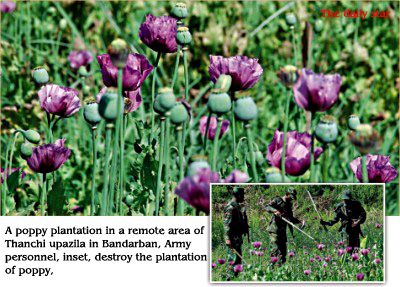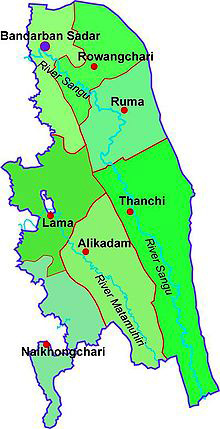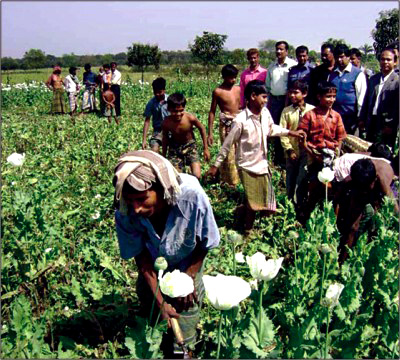The Bangladesh Army, along with a joint team, destroyed seven poppy plantations during a drive in remote areas of Remacry of Tanchhi Upazila in Bandarban, near the Burma border on February 23, according to an officer from the border...
Chittagong, Bangladesh: The Bangladesh Army, along with a joint team, destroyed seven poppy plantations during a drive in remote areas of Remacry of Tanchhi Upazila in Bandarban, near the Burma border on February 23, according to an officer from the border.
 A joint team of the army, Border Guard Bangladesh (BGB), Narcotics Control Department, and the police conducted the drive at Karaikashan, Ivaanman Jhiri. The authorities chopped down the poppy plants before burning them, the officer said.
A joint team of the army, Border Guard Bangladesh (BGB), Narcotics Control Department, and the police conducted the drive at Karaikashan, Ivaanman Jhiri. The authorities chopped down the poppy plants before burning them, the officer said.
Officials related to the drive said it is predominantly Burmese militant outfits that lure Bangladeshi hill tribe people into growing poppies.
Regional Commander Brig. Gen. Md Emdadul Hoque, Hill Tracts District Parishad Chairman Kyi Thu Hla, Deputy Commissioner Mijanur Rahman, and Superintendent of Police Kamrul Ahsan were also with the team.
Army Ruma Zone Commander Lt. Col. Wasim, leading the drive, said the 14-day-long drive started on February 19 and the operation will continue to clean up areas between Remacry and Bhalupara.
 The Team distributed vegetable seeds and musical instruments to the hill tribe people in remote areas of Bandarban close to the Burma border to discourage poppy cultivation and encourage the preservation of indigenous culture.
The Team distributed vegetable seeds and musical instruments to the hill tribe people in remote areas of Bandarban close to the Burma border to discourage poppy cultivation and encourage the preservation of indigenous culture.
A total of 29 hill tribe families received seeds and instruments at Remacry of Bandarban.
The army had destroyed a total of 122 poppy gardens in 2010 throughout these areas.
On July 29, 2010, Bandarban Hill District security forces in Bangladesh seized 15 arms along with ammunition from remote areas of the district, and destroyed about 20 acres of poppy fields in Sangu Reserved Areas under the Ruma, Alikadam, and Thanchi Security Zones of Bandarban Hill District of Bangladesh near the Burma border. The poppy fields were prepared during the cleaning of lands for cultivation by Mru hill tribes and other local people on the outskirts of the forest.
The Mru and local people were supported by the insurgent group, the Arakan Liberation Party (ALP), said an aide of the BDR on condition of anonymity. “At least 27 secret places were raided. During the raids firearms were recovered and poppy was destroyed.”
 Poppy fields on 18 bighas of land were destroyed by law enforcement agencies during three separate drives in Shahbazpur Union under Shibganj Upazila in Chapainawabganj District. Poppy fields in villages near the Burma borders, in addition to poppy plants and seeds, were lost destroyed in Khulna City during the first week of March 2009.
Poppy fields on 18 bighas of land were destroyed by law enforcement agencies during three separate drives in Shahbazpur Union under Shibganj Upazila in Chapainawabganj District. Poppy fields in villages near the Burma borders, in addition to poppy plants and seeds, were lost destroyed in Khulna City during the first week of March 2009.
So far, 35 poppy fields on 100 acres owned by insurgent groups from Burma have been destroyed by the army and the BDR along the Bangladesh-Burma border areas since February 17, 2008. The insurgent groups of Burma recruit local people to grow the poppy in remote areas. Such operations are launched annually to destroy poppy fields and to protect the minority people from illegal cultivation.
On the night of February 24, 2007, security personnel of the army and the BDR raided Alikadam and arrested three Burmese migrants (Rakhine) and destroyed the poppy crop. They also destroyed nine huts during the operation, according to a source from Nykhonchari in Bandarban District, Chittagong Hill Tracts (CHT).
Sources say that a permanent army camp is required in the border area to provide indigenous people with alternative work so that they do not indulge in poppy cultivation.



